lolcat
description: image combining a photograph of a cat with text intended to contribute humour
46 results
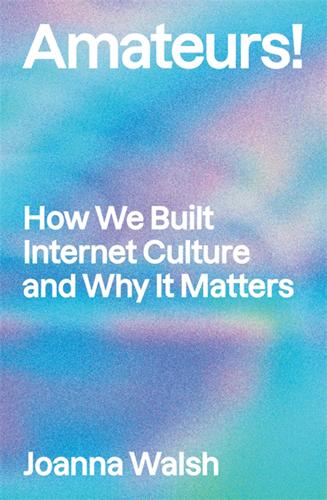
Amateurs!: How We Built Internet Culture and Why It Matters
by
Joanna Walsh
Published 22 Sep 2025
, then departed from the original phrase altogether, though its recognisability as a LOLcat has come to rely less on the initial phrase than on an identifiable style of writing – LOLspeak – that also relates to the languages of other non-LOLcat image macros. A meme seems to have no beginning or end, and its rules transpire through practice. The text on a LOLcat can be changed; the cat itself can be changed – it’s still a LOLcat. This 29is meming. The game is that the user changes an aspect of the work but the overall meme remains governed by a defined, evolving, aesthetic: LOLcats’ font is usually recognisably blocky and frames the photo, top and base.
…
Though there are clear links between the stuplimity of LOLspeak and the language of digital blackface, LOLcats don’t directly quote external media either visually or lexically but are hermetic, feeding only off other LOLcats. That the speakers are now cats creates an ‘interesting’ distance, explaining LOLcats’ popularity with L2 speakers like Huh as a safe space for playing out and playing with ‘mistake’, a mechanism that is matched by LOLcats’ tendency to depict cute #fails. If 4chan’s memes are designed to provoke LULz (schadenfreude) not LOLs, LOLcats’ #fails invite indulgence while simultaneously acting as a vehicle for the viewer’s/memer’s feelings of powerlessness. 43‘This recycling of sounds, images, and forms implies incessant navigation within the meanderings of cultural history, navigation which itself becomes the subject of artistic practice,’ wrote Nicolas Bourriaud in Postproduction (2002).
…
Ngai’s stuplimity, ‘undermining conventional patterns of grammar, syntax, and sense, threatens the limits of self by challenging its capacity for response’.20 LOLcats may be ‘dumb’, but their stuplime language both demands and defies response. If they ask a question, it is rhetorical, or just plain orthogonal. 40Their dumbness is insolent, their humour subaltern. They are a call to modulation that inevitably threatens the limits of self as a single speaker/originator of language. The text on a LOLcat often appears to be a commentary on the cat, while simultaneously seeming to be spoken by it, rendering LOLcats a critique of mediated expression. It’s no accident that the creators of LOLcats understand what it is to be linguistic outsiders.
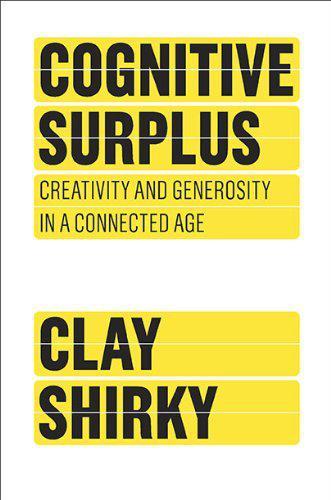
Cognitive Surplus: Creativity and Generosity in a Connected Age
by
Clay Shirky
Published 9 Jun 2010
ICanHasCheezburger.com has more than three thousand lolcat images—“i have bad day,” “im steelin som ur foodz k thx bai,” “BANDIT CAT JUST ATED UR BURRITOZ”—each of which garners dozens or hundreds of comments, also written in lolspeak. We are far from Ushahidi now. Let’s nominate the process of making a lolcat as the stupidest possible creative act. (There are other candidates, of course, but lolcats will do as a general case.) Formed quickly and with a minimum of craft, the average lolcat image has the social value of a whoopee cushion and the cultural life span of a mayfly. Yet anyone seeing a lolcat gets a second, related message: You can play this game too. Precisely because lolcats are so transparently created, anyone can add a dopey caption to an image of a cute cat (or dog, or hamster, or walrus—Cheezburger is an equal-opportunity time waster) and then share that creation with the world.
…
For every remarkable project like Ushahidi or Wikipedia, there are countless pieces of throwaway work, created with little effort, and targeting no positive effect greater than crude humor. The canonical example at present is the lolcat, a cute picture of a cat that is made even cuter by the addition of a cute caption, the ideal effect of “cat plus caption” being to make the viewer laugh out loud (thus putting the lol in lolcat). The largest collection of such images is a website called ICanHasCheezburger.com, named after its inaugural image: a gray cat, mouth open, staring maniacally, bearing the caption “I Can Has Cheezburger?” (Lolcats are notoriously poor spellers.) ICanHasCheezburger.com has more than three thousand lolcat images—“i have bad day,” “im steelin som ur foodz k thx bai,” “BANDIT CAT JUST ATED UR BURRITOZ”—each of which garners dozens or hundreds of comments, also written in lolspeak.
…
Precisely because lolcats are so transparently created, anyone can add a dopey caption to an image of a cute cat (or dog, or hamster, or walrus—Cheezburger is an equal-opportunity time waster) and then share that creation with the world. Lolcat images, dumb as they are, have internally consistent rules, everything from “Captions should be spelled phonetically” to “The lettering should use a sans-serif font.” Even at the stipulated depths of stupidity, in other words, there are ways to do a lolcat wrong, which means there are ways to do it right, which means there is some metric of quality, even if limited. However little the world needs the next lolcat, the message You can play this game too is a change from what we’re used to in the media landscape.
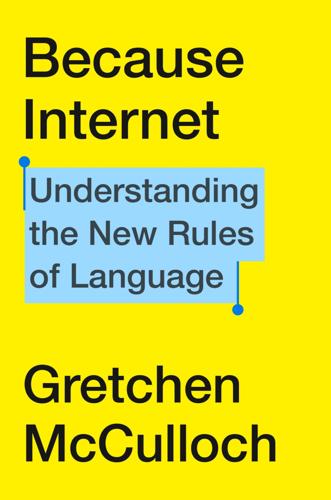
Because Internet: Understanding the New Rules of Language
by
Gretchen McCulloch
Published 22 Jul 2019
Instead, people loved them. A further macro came with an even more popular meme: lolcats. People started sharing pictures of blissed-out cats with overlaid text on the anonymous forum 4chan starting in 2005, in a Saturday celebration of cats known as “Caturday,” and the lolcat phenomenon eventually occasioned articles everywhere from academic journals to Time magazine. Like the earlier memes, the first lolcats had their text added manually, using graphics programs like Photoshop and Microsoft Paint. As lolcats became popular, so did a second kind of timesaving macro, which would place the text automatically on the base image—much faster than downloading it to a separate program.
…
These meme generator sites promoted a consistent meme aesthetic: the all-caps, black-bordered white Impact font (a brilliant innovation in automatic caption generation because it stands out easily no matter what colors or patterns are behind it). Making lolcat generation easier became controversial. Putting text on top of an image had formerly required a certain amount of technical knowledge of photo-editing software. Now, it was easy. Too easy, according to some “insiders.” Technologist Kate Miltner documented this split among two kinds of lolcat fans in the late 2000s. Self-described MemeGeeks had liked the early kind of lolcats on 4chan but had moved on to other memes, like Advice Animals, as lolcats became more popular and easier to create. Self-described Cheezfriends, on the other hand, tended to reside on the site I Can Has Cheezburger and demonstrated their community membership through fluency in the stylized lolspeak itself, rather than technical prowess creating the memes.
…
“What Is the Best Term to Categorize a Lolcat Image and Text?” English Language & Usage Stack Exchange. english.stackexchange.com/questions/69210/what-is-the-best-term-to-categorize-a-lolcat-image-and-text. Hugo. September 11, 2008. “Antedatings of ‘image macro.’” LINGUIST List. listserv.linguistlist.org/pipermail/ads-l/2013-September/128420.html, via Ben Zimmer. 2011. “Among the New Words.” American Speech 86(4). pp. 454–479. People started sharing pictures: Lev Grossman. July 16, 2007. “Lolcats Addendum: Where I Got the Story Wrong.” Techland, Time. techland.time.com/2007/07/16/lolcats_addendum_where_i_got_t/.
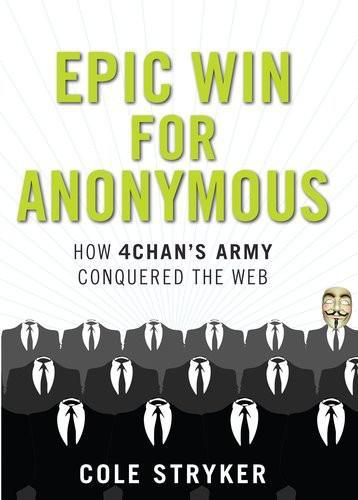
Epic Win for Anonymous: How 4chan's Army Conquered the Web
by
Cole Stryker
Published 14 Jun 2011
If I come across someone who’s never heard of Internet memes, the first thing I usually say is, “Have you ever seen lolcats?” That’s because it’s not only the biggest thing to come out of 4chan, it’s the undisputed biggest Internet meme. Here’s the idea: A humorous photo of a cat accompanied by a caption written in a pidgin English derived from rushed IM speak. The stupidly funny broken English coupled with the inherent cuteness of the cat images made for a viral phenomenon. lolcats were dumb, catchy, and approachable enough that anyone could pick up on the humor after seeing a few. lolcats first showed up on 4chan in 2005 as a cute joke contrasting with the site’s usual stream of gross-out content, but they did not achieve cultural ubiquity until 2007, when Ben Huh bought http://www.icanhazcheezburger.com and formed the site around lolcats.
…
And anyone who’s slapped a few words on a picture of their cat has already crossed that gulf. The invitation to make something and share it with other people on that scale is so radically different from what we were capable of doing in the twentieth century, that even a lolcat, one of the stupidest creative acts, is still a creative act. Clay explains that we regard lolcats as an inexplicable novelty because the network on which they happen is so new. But the drive to share funny or interesting things with each other is a deeply entrenched human (not to mention animal) trait. So people who shake their heads and say, “Why would anyone waste their time with this stuff?”
…
lolcats first showed up on 4chan in 2005 as a cute joke contrasting with the site’s usual stream of gross-out content, but they did not achieve cultural ubiquity until 2007, when Ben Huh bought http://www.icanhazcheezburger.com and formed the site around lolcats. Now there are millions of lolcat images all over the web, generating millions of dollars. And it all came from /b/’s “Caturday” tradition of posting cute captioned cats each Saturday. Ah, here’s a big 4chan obsession: a camgirl thread. The words camgirl or camwhore describe a girl on the Internet who attracts the attention of men by using her beauty for fun or profit. Girls on 4chan will post photos of themselves on /b/, usually holding up a piece of paper (or sometimes drawing directly on their bodies with a Sharpie) that reads something along the lines of “APRIL 5TH, 4:47PM Sup /b/” in order to prove the authenticity of the photo.
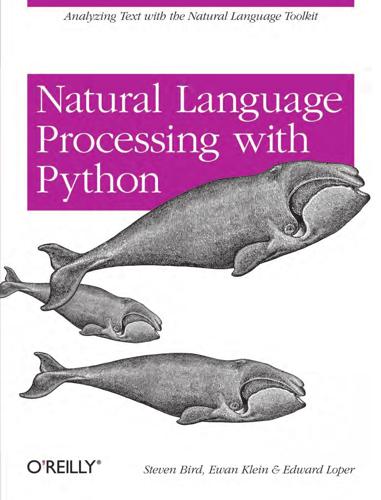
Natural language processing with Python
by
Steven Bird
,
Ewan Klein
and
Edward Loper
Published 15 Dec 2009
Investigate this phenomenon with the help of a corpus and the findall() method for searching tokenized text described in Section 3.5. The post is at http://itre.cis.upenn.edu/~myl/languagelog/archives/002733.html. ◑ Study the lolcat version of the book of Genesis, accessible as nltk.corpus.gene sis.words('lolcat.txt'), and the rules for converting text into lolspeak at http:// www.lolcatbible.com/index.php?title=How_to_speak_lolcat. Define regular expressions to convert English words into corresponding lolspeak words. ◑ Read about the re.sub() function for string substitution using regular expressions, using help(re.sub) and by consulting the further readings for this chapter.
…
The function has parameters for the text and the word length, and an extra parameter that allows the initial value of the result to be given as a parameter: >>> def find_words(text, wordlength, result=[]): ... for word in text: ... if len(word) == wordlength: ... result.append(word) ... return result >>> find_words(['omg', 'teh', 'lolcat', 'sitted', ['omg', 'teh', 'teh', 'mat'] >>> find_words(['omg', 'teh', 'lolcat', 'sitted', ['ur', 'on'] >>> find_words(['omg', 'teh', 'lolcat', 'sitted', ['omg', 'teh', 'teh', 'mat', 'omg', 'teh', 'teh', 'on', 'teh', 'mat'], 3) 'on', 'teh', 'mat'], 2, ['ur']) 'on', 'teh', 'mat'], 3) 'mat'] The first time we call find_words() , we get all three-letter words as expected.
…
After calling the function, w is unchanged, while p is changed: >>> def set_up(word, properties): ... word = 'lolcat' ... properties.append('noun') ... properties = 5 ... >>> w = '' >>> p = [] >>> set_up(w, p) >>> w '' >>> p ['noun'] Notice that w was not changed by the function. When we called set_up(w, p), the value of w (an empty string) was assigned to a new variable word. Inside the function, the value 144 | Chapter 4: Writing Structured Programs of word was modified. However, that change did not propagate to w. This parameter passing is identical to the following sequence of assignments: >>> >>> >>> >>> '' w = '' word = w word = 'lolcat' w Let’s look at what happened with the list p.
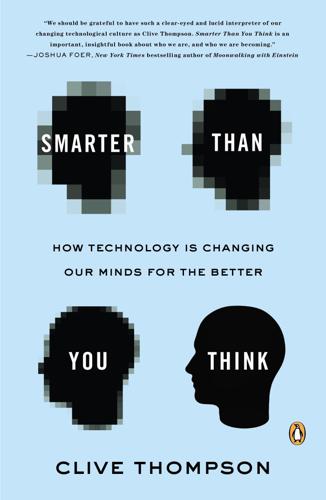
Smarter Than You Think: How Technology Is Changing Our Minds for the Better
by
Clive Thompson
Published 11 Sep 2013
This led to yet more mockery, as commenters hunted down original images of the model, Filippa Hamilton, and compared her unaltered body (skinny, but within a human range) to the extraterrestrial manipulations of Ralph Lauren. The precise moment that text-picture memes went mainstream was probably with the LOLcat—a picture of a cute animal layered with intentionally illiterate text. As the joke spread across the globe, pundits soon began castigating the LOLcat as another example of the dumbing down of digital culture. But LOLcat-crafting skills can become quite powerful when applied to other areas—even as political speech. In China, visual creations have been crucial in subverting the government’s censorship regime.
…
For example, when the mobile phone was expensive and in the hands of the few, it was purely a corporate mechanism; when the price dropped and everyone had one in their back pocket, it became a vehicle for sousveillance, for self-organizing bar crawls, for inventing rebuslike short forms of expression, for staying in ambient contact with the world. Technological habits that seem laughable (sending smiley-bedecked text messages; making LOLcats) turn out to also be world-changing (sending text messages to Ushahidi to manage a crisis; using captioned pictures to outwit Chinese censors). We’ll truly figure out what Watson is for only when people begin using the software to make jokes, to play games, to hassle each other. Or to seek not answers but questions: Andy Hickl, an AI inventor, once developed a contradiction engine that took any statement and found contradictory evidence.
…
See attention/focus; cognition; education and learning Leibniz, Gottfried Wilhelm, 12 Lessin, Sam, 242 letter writing, 48–49 Lévy, Pierre, 172 libraries access to information in, 121–22 search, instruction in, 205–6 use, lack of knowledge of, 207 Libri deflorationum, 119 Lifebrowser, 39 lifeloggers, 29–44 benefits of logging, 31–32, 35–36 methods of, 29–30, 34, 36–39, 41, 43–44 search problem, 32–35 social issues, 41–42 Lineage (video game), 196 Linux, 171 literacies, new, 83–113 data literacy, 83–93 meaning of, 86–87 photographic literacy, 105–10 and reading versus writing, 50–51 search literacy, 204–6 3-D design literacy, 111–13 video literacy, 94–105 location. See geolocation; mapping Loftus, Elizabeth, 24–25 Logo, 190–93 Logo Microworlds, 192 LOLcat-crafting, 108–9 Looxcie, 41 Los Angeles Times wikitorial, 159 Lost (TV show), 96 Lostpedia, 187 Luff, Paul, 213 Lunsford, Andrea, 66–68 Luria, Alexandr, 40 Luther, Martin, 249 McCain, John, 88 McIntosh, Jonathan, 100 MacKinnon, Rebecca, 270, 276 McLuhan, Marshall, 8, 102 McPherson, Sam, 187 Mad Libs, 191 MadV, 101 Magna Carta, 276 Maher, Ahmed, 255 Mahfouz, Asmaa, 259 MakerBot, 111–12 maker movement, 103 Malebranche, Nicolas, 119–20 Manjoo, Farhad, 261 Mann, Steve, 266–67 Many Eyes, 91–92 mapping electoral districts, tool for, 84–86 Haiti earthquake relief, 265–66 Ushahidi, development of, 62–63 Marconi, Guglielmo, 59 Marcus, Gary, 14 Maree, Daniel, 265 marginalia, 82 Mario Kart (video game), 37 Mark, Gloria, 135–36, 137 Mark, Kevin, 79 Martin, Trayvon, 264–65 mash-up videos, 100 math digital instruction, 175–78, 181–83, 191 learning difficulty related to, 189 “Mathematical Creation” (Poincaré), 131–32 Maverick, Augustus, 6 Mayer-Schönberger, Viktor, 42, 241 Mechanical Turk, 1 media convergence, 111 medical diagnosis supercomputer, 284–85 meditation, 137–38 Meier, Patrick, 266 memex, 123, 143 memorization opponent of, 119–20 proponents of, 132–33 memory.
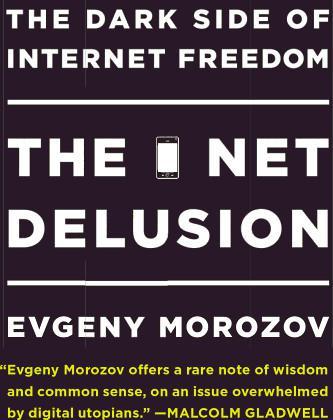
The Net Delusion: The Dark Side of Internet Freedom
by
Evgeny Morozov
Published 16 Nov 2010
How NASDAQ Will Save the World From Milk Shakes to Molotov Cocktails Why Hipsters Make Better Revolutions In Search of a Missing Handle chapter two - Texting Like It’s 1989 WWW&W Cyber Cold War Nostalgia’s Lethal Metaphors Why Photocopiers Don’t Blog Which Tweet Killed the Soviet Union? Hold On to Your Data Grenade, Comrade! When the Radio Waves Seemed Mightier Than the Tanks chapter three - Orwell’s Favorite Lolcat How Cable Undermines Democracy The Denver Clan Conquers East Berlin The Opium of the Masses: Made in GDR Watching Avatar in Havana Online Discontents and Their Content Intellectuals The Orwell-Huxley Sandwich Has Expired Mash ’Em Up! The Trinity of Authoritarianism chapter four - Censors and Sensibilities Dress Your Own Windows The Kremlin Likes Blogs and So Should You Dictators and Their Dilemmas When Censors Understand You Better Than Your Mom Does Time to Unfriend We Don’t Censor; We Outsource!
…
Simply opening up the information gates would not erode modern authoritarian regimes, in part because they have learned to function in an environment marked by the abundance of information. And it certainly doesn’t hurt that, contrary to the expectations of many in the West, certain kinds of information could actually strengthen them. chapter three Orwell’s Favorite Lolcat “The Tits Show” sounds like a promising name for a weekly Internet show. Hosted by Russia.ru, Russia’s pioneering experiment in Internet television supported by Kremlin’s ideologues, the show’s format is rather simple: A horny and slightly overweight young man travels around Moscow nightclubs in search of perfect breasts.
…
All potential revolutionaries seem to be in a pleasant intellectual exile somewhere in California. The masses have been transported to Hollywood by means of pirated films they download from BitTorrent, while the elites have been shuttling between Palo Alto and Long Beach by way of TED talks. Whom exactly do we expect to lead this digital revolution? The lolcats? If anything, the Internet makes it harder, not easier, to get people to care, if only because the alternatives to political action are so much more pleasant and risk-free. This doesn’t mean that we in the West should stop promoting unfettered (read: uncensored) access to the Internet; rather, we need to find ways to supplant our promotion of a freer Internet with strategies that can engage people in political and social life.

Collaborative Society
by
Dariusz Jemielniak
and
Aleksandra Przegalinska
Published 18 Feb 2020
Its members enjoy dark and morbid humor, weird porn, and practical jokes. (One such “joke” involved persuading quite a few iPhone owners that microwaving their phones was a viable method for charging them.) The 4chan site gained notoriety for posting a large number of leaked, nude celebrity photos back in 2014. It popularized memes such as lolcats and pedobear (yes, a cartoon bear used to mock human predators with a sexual interest in children). A number of major social actions started on 4chan via successful DDoS (distributed denial of service) attacks on the websites of two anti-piracy organizations, the Motion Picture Association of America and the Recording Industry Association of America.
…
Ethan Zuckerman describes an example of this type of unintended opportunity in his cute cat theory of digital activism, which also relates to our discussion about cyberactivism and hacktivism in chapter 5.9 He observes that internet users are more likely to surf the web for low-value but viral online content—such at cute cat videos—than to participate in activism, and because of this various means of web censorship can be sidestepped. Lolcats and similar humorous materials can nevertheless carry (and serve as covers for) political messages dispersed among memes or attention-drawing gifs and pictures. In this sense, Facebook, Twitter, or Flickr are very useful platforms to social movement activists, who may (and usually do) lack resources to develop dedicated platforms or tools themselves.
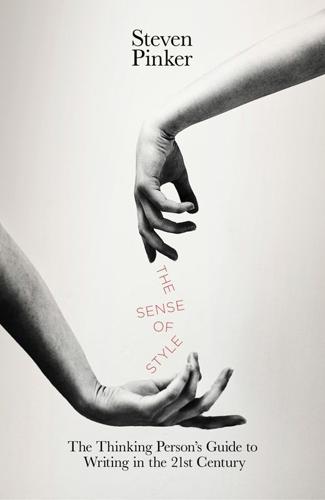
The Sense of Style: The Thinking Person's Guide to Writing in the 21st Century
by
Steven Pinker
Published 1 Jan 2014
Take agreement between the subject and the verb: we say The bridge is crowded, but The bridges are crowded. It’s not a hard rule to follow. Children pretty much master it by the age of three, and errors such as I can has cheezburger and I are serious cat are so obvious that a popular Internet meme (LOLcats) facetiously attributes them to cats. But the “subject” and “verb” that have to agree are defined by branches in the tree, not words in the string: You might be thinking, What difference does it make? Doesn’t the sentence come out the same either way? The answer is that it doesn’t. If you fatten up the subject by stuffing some words at the end, as in the diagram below, so that bridge no longer comes right before the verb, then agreement—defined over the tree—is unaffected.
…
The verb vulcanize means “to strengthen a material such as rubber by combining it with sulfur and then applying heat and pressure.” Many of these rules have become entrenched in a vast community of English speakers, who respect the rules without ever having to think about them. That’s why we laugh at Cookie Monster, LOLcats, and George W. Bush. A subset of these conventions are less widespread and natural, but they have become accepted by a smaller virtual community of literate speakers for use in public forums such as government, journalism, literature, business, and academia. These conventions are “prescriptive rules”—rules that prescribe how one ought to speak and write in these forums.
…
In a 2013 press release President Barack Obama praised a Supreme Court decision striking down a discriminatory law with the sentence “No American should ever live under a cloud of suspicion just because of what they look like.”47 In doing so he touched one of the hottest usage buttons of the past forty years: the use of the plural pronouns they, them, their, and themselves with a grammatically singular antecedent like no American. Why didn’t the president write because of what he looks like, or because of what he or she looks like? Many purists claim that singular they is a LOLcat-worthy grammatical howler which is tolerated only as a sop to the women’s movement. According to this theory, the pronoun he is a perfectly serviceable gender-neutral pronoun; as grammar students used to be taught, “The masculine embraces the feminine, even in grammar.” But feminist sensibilities could not abide even the illusory sexism of using a masculine form to represent both genders, and so they engaged in a campaign of linguistic engineering that started with a mandate to use the clumsy he or she and slipped down a slope that ended in singular they.
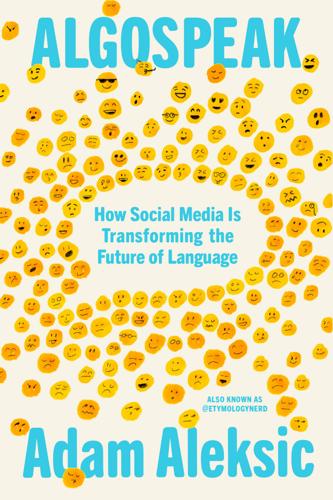
Algospeak: How Social Media Is Transforming the Future of Language
by
Adam Aleksic
Published 15 Jul 2025
The different stages of being online also mean that each generation has grown up in a different period of meme history, resulting in a subtle cultural polarization over what we find funny. Boomers, who grew up with newspaper cartoons, are caricatured as enjoying single-panel comics making fun of “the wife” or “kids these days.” Millennials, who grew up in the era of image macros, LOLcats, and Advice Animal memes, are thought to try too hard at being “quirky.” Gen Z, meanwhile, has become known for their sense of wry yet detached absurdism. Even our emojis are different: Older generations tend to use them literally, while younger generations have increasingly abstracted them to varying degrees of irony.
…
See also microlabels Lady Bountiful (Carr), 18, 18 laggards, 53–55, 54 Language and the Internet (Crystal), 10n large language models, 209 late majority, 53, 54 Latin, 5, 7, 69n Latino dance circles, 147 laughing-crying emoji , 53–54, 188 laughing emoji, 53 LDAR (lay down and rot), 136 “le dollar bean,” 30 leetspeak, 14–15, 17, 34–35 “left this world,” 5 “leg booty,” 30 Legendary (TV show), 148 lesbian, substitutions for, 30 le$bian, 30 “Let’s Go Brandon,” 23 LGBTQ+/LGBTQIA+, 6, 29–30, 147–48, 204 lies, 66 lifestyle influencer accent, 82–89, 93–97, 167, 203 light academia, 166, 179 Lil Meatball, 39 linguistic appropriation, 146 linguistic contexts, multiple, 51 linguistic diversity, 213–16 linguistic experimentation, 72–73 linguistic founder effect, 95–96 linguistic landscape, new, 13 linguistic resonance, 61 linguistic tricks, 78 linguistic videos, 104 linguistic Whac-A-Mole, 12, 14–16, 30, 36, 108–9, 109, 209–10 “List of Generation Z Slang,” 190 literacy rates, 10 Little Women (Alcott), 167 Liverpool dialects, 216 lol, 38 LOLcats, 188 lolspeak, 35 long-tail model, 171–74, 171 lookism, 124–25, 129–30, 132, 134–35, 137–38 looksmaxxing, 125–26, 128–29, 132–33, 137, 190 lore, 200–202, 204 Lorenz, Taylor, 8 Lost Generation, 186 lowkey, 72 “low-key ate,” 206 M machine learning algorithms, 59 Mad Libs, 48 Madonna, 148 MAGA, 23 Maher, Olivia, 71 Mai, Anthony, 52–53 Mailer, Norman, 23 main characters, 202, 205 majority adopters, 140 makeup videos, 203 male supremacy, 130 Mandal, Shriya, 59–61, 76 manuscripts, 201 marginalized groups, 114–15, 154 marital probation, 72 marketing, 60, 69, 170–85, 189, 204–5, 213 mass-report videos, 29 Matthew effect, 77–78, 133 maxxing, 128, 133, 137 McCulloch, Gretchen, 10n McDonald, Glenn, 166–67, 173–74, 181–82 McDonald’s restaurants, 81 Mean Girls (film), 56 meaning making, 200–201 medical educational content, 20 Megan Thee Stallion, 175 Melcher, Louisa, 66–67 memes, 4–6, 48–50, 53–55, 73, 198, 219, 220 algorithms and, 9 attention hacking and, 141 context and, 199 culture and, 57 4chan and Reddit and, 140–41 history of, 188 marketing and, 141 metadata and, 9, 57 obtrusive, 56 spread of, 9, 12, 48–52, 56, 137, 191 men, substitutions for, 19, 25, m*n, 19, 25 men’s rights trolls, 135 mental health, 4, 9 mentally disabled, 30 Merriam-Webster, 197 Meta, 41, 172 metadata, 9, 43, 45–46, 50, 57, 101, 107–8, 164, 173, 183 metonymy, 24–25, 27 mewing, 126, 132, 138, 141, 190, 206–7 “Michael Jackson Eating Popcorn,” 155 microhooks, 69, 83 microinfluencers, 96 microlabels, 165–84, 189, 203–4 Middle East, 29 middle-schoolers, 3–5, 7–8, 46–47, 73n, 151, 161, 191–93 millennial pause, 85–86, 188 millennial pink, 187, 189 millennials, 141, 187–90, 193, 196, 204 millennial socks, 187 Minaj, Nicki, 41, 43, 157 minced oaths, 22–23 minorities, 28, 150 minority language, 218 misinformation, 116–18, 142, 212 misogyny, 127, 130, 135 mog, 125, 132, 134, 210 mogging, 128–29, 132 Mogwarts, 126 monkeycore, 164 Montell, Amanda, 136 moron, 30 mors, 5, 7 “most interesting thing about X,” 68 “Mother” (song), 148–49 “mothers,” 147, 149 MrBeast, 86–89, 91–92, 97 Museum of Pop Culture (Seattle), 3, 5, 7, 10 Musical.ly app, 40–41 music industry, 41–42, 166, 184, 212 “My favorite thing about X is,” 62 N nail polish emoji , 29 Naked and the Dead, The (Mailer), 23 Narayanan, Arvind, 106, 117–18 narrative language, 203 National Association of the Deaf, 218 National Council on Severe Autism, 116 naturecore, 165 negativity, 118–21, 135–36, 139, 219 neologisms, 175 Netflix, 68 netspeak, 34 neurodivergent community, 115, 116 neurospicy, 115, 117 “neutral” American dialect, 93–94 Newgen, 137 Newman, Kayla, 157–59 news broadcasts, 93–94 News Daddy of TikTok, 211–12 newspaper comics, 18, 188 newspapers, 38, 49, 68, 108, 113 news sources, 211–12 New Yorker, 218 New York Times, 62, 175, 192–93, 211–12, 216–17 New York University (NYU), 62–63 nia, 152 niche communities, 99–123, 140, 171–73, 181–82 ninja emoji , 21 “nip nops,” 22, 50 Nirvana, 3 “no because,” 73–77 noguing, 149 non-Deaf ASL creators, 217 noob, 35, 38 normies, 128 “Not you,” 146 “not you doing ____,” 73 NPCs, 202 NPR, 82 number 13, 100 n-word, substitutions for, 21, 28, 152 O Oberlin College, 126 obtrusiveness, 55, 56, 192 offensive words, 17–18, 30 offline, online words moving, 10, 35, 42, 73, 77, 108, 110–12, 116, 122, 203, 211, 216 ohio, 44 O.K., 38, 108, 113 okay, 38, 49 “OK boomer,” 188, 196 Old English, 5 “old money,” 179 Old Norse, 5 “Old Town Road” (song), 42 oligopoly, 181 “One thing people don’t tell you about X is Y,” 65 “on fleek,” 39, 55, 158–59 “on god,” 47n “on gyat,” 47 online disinhibition effect, 135 online intertextuality, 199 online sociolects, 34, 35 “on sigma,” 47, 50 “on skibidi,” 47 “on X,” 47 opening lines, 62–68, 76 opp, 152, 154, 162, 210 optimal distinctiveness, 183 Orange Is the New Black, 48 “orange man,” 25 “orange peel theory,” 72 originators, crediting, 158–60 out-groups, 103, 115–16, 148, 155, 189, 193, 201, 221 Oxford English Dictionary, 47 “Oxford study,” 135, 138–39 Oxford University Press, 191n P Page, Dylan, 211–12 Palestine, 26 Palestine flag emoji , 27 palm (of hand), 27, 34 parasocial interactions, 64, 84 Paris Is Burning (documentary), 148 Parker, Charlie, 145 party, substitution for, 49, 57 “passed away,” 5, 9 pastel goth, 168–70, 181, 201, 203 pattern recognition, 201 Payman, Fatima, 210–11 pay-to-play models, 181 PBS Origins (TV show), 156 peach emoji , 20–21 peen, 22 pee-pee, 22 pen, pencil, 19–20 penis, respellings of, 19–22 p3nis, 20 pen*s, 20 people, 64–65 “People are finally doing X,” 65 Pepe the Frog meme, 134 performance art, 66 period, 155, 160 “periodt,” 155 permanent wave music, 166 personalized recommendations, 12, 40–41, 43, 61, 99–123, 189, 204 PewDiePie, 173 Pew Research Center, 187 pHashing technique, 140–41 phrasal templates, 47–48, 50–51, 56, 73, 110–11, 121, 133 phrases, coining, 158 phrenological theories, 133, 135 pictography, 20–21, 35 pilled, 126, 133, 137 Pinker, Steven, 30 plaguecore, 164 plausible deniability, 25, 159 plot, 202 Poe’s law, 138–39 Pokémon discussion board, 140 polarization, 110, 119, 218–19 political discourse, 6, 19, 24–25, 110, 119 pop culture, 12 pornography, 6, 20–21, 34 portmanteaus, 100 Portuguese language, 206–7 positive feedback loops, 42, 55, 77, 104–5, 190 posting time, 61 post-ironic nods, 199 postmodern aesthetics, 169 post titles, 59–60 post-Vine, 47 pr0n, 34 prawn, 34 preferences, stated vs. revealed, 119–21, 123 preferential attachment, 215 preppy, 176–79, 181–83, 189, 195 presentation styles, 69–70 Presley, Elvis, 156 prestige dialect, 92–94, 215 “pretty on fleek,” 157 preverb music, 166 priming, 75 print media, 10, 38, 51, 52 pro-Palestine creators, 27 psychology, 58, 69, 75 punk music, 164 punks, 145, 168, 201 pwned, 35 Q QAnon, 134 queens, 147–48, 157, 161 queer community, 29–30, 52, 147, 149, 204.
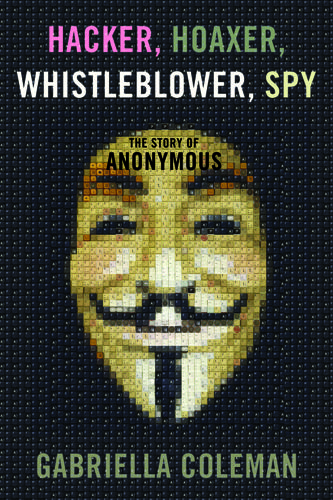
Hacker, Hoaxer, Whistleblower, Spy: The Story of Anonymous
by
Gabriella Coleman
Published 4 Nov 2014
Since it launched in 2003, 4chan has become an immensely popular, iconic, and opprobrious imageboard. Composed of over sixty-three (at the time if this writing) topic-based forums ranging from anime to health and fitness, it is both the source of many of the Internet’s most beloved cultural artifacts (such as lolcats memes), and one of its most wretched hives of scum and villainy. The “Random” forum, also called “/b/,” teems with pornography, racial slurs, and a distinctive brand of humor derived from defilement. It is where trolling once flourished. One “/b/tard” (as the forum’s denizens are called) explained to my class that “everyone should have a good sense that /b/ is an almost completely unfiltered clusterfuck of everything you could imagine, and lots of stuff you couldn’t imagine or wouldn’t want to.”
…
Aesthetically, the more extreme a piece of content is, the better, for it ensures the interest of lsparticipants, and motivates replies to threads (keeping them alive). In particularly novel cases, an extreme piece of content can even circulation beyond the board—to distant lands like the message board t community, reddit, bodybuilding.com, and, eventually, mass cultural awareness. Remember, Lolcats got their start on 4chan. Trolls, in particular, focus on the collective pursuit of epic wins—just one form of content among many. (To be clear, 4chan houses many trolls, but many participants steer clear of trolling activity. Still others avoid activity altogether—they are there as spectators or lurkers.)
…
On January 2, 2011, a hacker named “rubik” (not his real pseudonym), who had been working on two private channels, swooped in to announce that a Tunisian website had been defaced (all pseudonyms have been changed): rubik: http://www.pm.gov.tn/pm/index.php—defaced OT: way to go anons!!!!! OT: wayy to fucking go! rubik: Fucking A! Nice Job OT: More to come biotches :P rubik:: http://www.marchespublics.gov.tn/ also. K-rad: http://www.pm.gov.tn and http://www.marchespublics.gov.tn/ DE-FUCKING-FACED! lafdie: btw mad props on the lolcats: http://www.pm.gov.tn/pm/index.php vvom: http://www.pm.gov.tn/pm/index.php BOOYA MOTHERFUCKERS A group of hackers had been hard at work, cooperating as a team, for some time. Yet the majority of journalists couldn’t resist the opportunity to pinpoint a “mastermind” or “leader,” the architect ostensibly maneuvering everyone else.
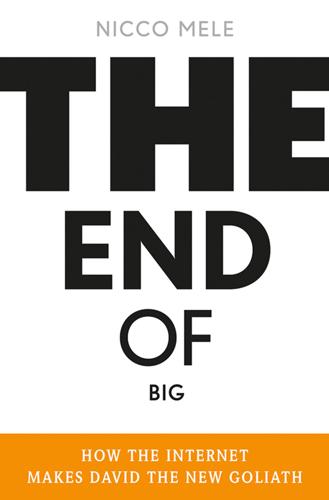
The End of Big: How the Internet Makes David the New Goliath
by
Nicco Mele
Published 14 Apr 2013
At first, 4chan was a place to post pictures, but it has evolved into a place where anyone can come and talk about or share anything. At any given moment, hundreds of thousands of people will be on 4chan.org at once. It’s an online home to millions of people and the birthing ground for many an Internet meme, including Lolcats, “probably the Internet’s top meme—the hundreds of thousands of pictures of cats that float around every corner of the Net, with cat-speak captions: ‘om nom nom goes the hungry cat.’” Other noteworthy 4chan accomplishments include lodging a swastika on Google’s list of breaking trends and spreading a “rumor that Steve Jobs had a heart attack,” causing Apple shares to plummet.43 In 2008, as 4chan.org was approaching its fifth birthday, it began to develop something of a political consciousness.
…
Evgeny Morozov, The Net Delusion: The Dark Side of Internet Freedom by (New York: PublicAffairs, 2011), 53. 40. http://www.fastcoexist.com/1678169/afghanistans-amazing-diy-internet 41. To this trinity, Morozov adds a fourth hallmark, provided to a large extent by the technologies of radical connectivity: entertainment. In a chapter titled, “Orwell’s Favorite Lolcat” he writes, “Another Sakharov seems inconceivable in today’s Russia, and in the unlikely event he does appear, he would probably enjoy far less influence on Russian national discourse than Artemy Lebedev, Russia’s most popular blogger, who uses his blog to run weekly photo competitions to find a woman with the most beautiful breasts (the subject of breasts, one must note, is far more popular in the Russian blogosphere than that of democracy). … But efficiency and comfort—which the Internet provides—are not necessarily the best conditions for fomenting dissent among the educated classes. … If anything, the Internet makes it harder, not easier to get people to care, if only because the alternatives to political action are so much more pleasant and risk-free.”
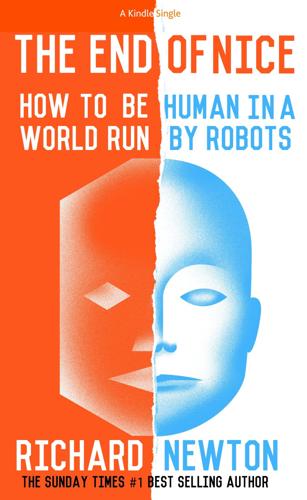
The End of Nice: How to Be Human in a World Run by Robots (Kindle Single)
by
Richard Newton
Published 11 Apr 2015
“Hi, I’m the future and you’ve got a choice to make.” The future announced it was already here and it presented you with two options: Option 1: The realisation of human potential that could be unleashed by adopting the behaviour of artists, inventors and entrepreneurs. Option 2: The slide into passive consumption of content, of lolcats, of meaninglessness, of being nudged and controlled by siren servers. A mere drone serving the Machine. Globalisation, connectedness, robotics, social sharing and intimidating computer power have changed the world in a decade and demonstrate how fast the future is becoming the present. The distance between the weird future and the present that we’re still adjusting to is ever shrinking, ever faster.
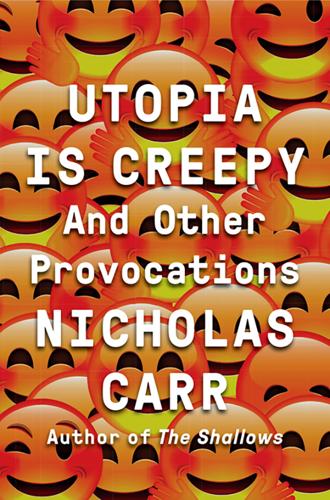
Utopia Is Creepy: And Other Provocations
by
Nicholas Carr
Published 5 Sep 2016
As Bradley Bloch explained in a recent Huffington Post article, the ease with which amateur media productions can be distributed online actually has the paradoxical effect of increasing people’s media consumption far more than it increases their media production. “Even if we count posting a LOLcat as a creative act,” observes Bloch, “there are many more people looking at LOLcats than there are creating them.” Bloch runs the numbers on one oft-viewed YouTube entertainment: “One of the most popular videos on YouTube, ‘Charlie bit my finger—again!,’ depicting a boy sticking his fingers in his little brother’s mouth, has been viewed 211 million times.
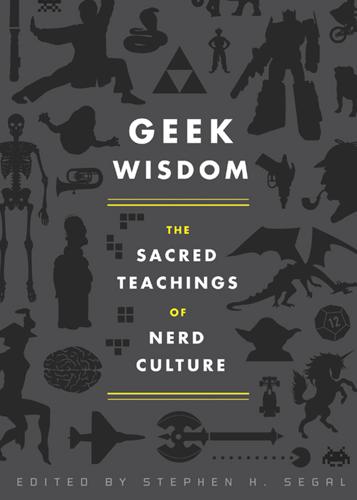
Geek Wisdom
by
Stephen H. Segal
Published 2 Aug 2011
Thus “take off and nuke the site from orbit” has become geek shorthand for putting a decisive end to any dangerously messy problem. Overkill? Maybe. But sometimes you just have to be sure. In our personal version of the Alien universe, Newt and Ripley and the cat are all off somewhere living happily ever after. They deserve it. “IT’S DANGEROUS TO GO ALONE! TAKE THIS.” —CAPTION FROM THE LEGEND OF ZELDA, TURNED INTO A LOLCAT MEME SMART PEOPLE ARE OFTEN self-sufficient and confident, particularly when it comes to our particular area(s) of expertise. The average geek is often the only person in the group who’s capable of solving some arcane and specialized problem. Which presents a whole ’nother problem: Even though geeky confidence and competence can sometimes lead to obnoxious and undeserved arrogance, the plain fact of the matter is that, frequently, when it comes to a particular topic, the geek really is the most knowledgeable person in the room.
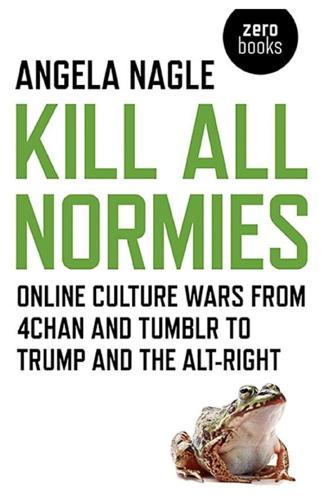
Kill All Normies: Online Culture Wars From 4Chan and Tumblr to Trump and the Alt-Right
by
Angela Nagle
Published 6 Jun 2017
Weird pornography, in-jokes, nerdish argot, gory images, suicidal, murderous and incestuous thoughts, racism and misogyny were characteristic of the environment created by this strange virtual experiment, but it was mostly funny memes. Poole has called 4chan a ‘meme factory’ and it undoubtedly created countless memes that made their way into mainstream Internet-culture. The most famous early examples of these were probably LOLcats, a cat-picture based style of image macro, and rickrolling, the use of a link to seemingly serious content that sends its user to a video of Rick Astley singing Never Gonna Give You Up. The users of 4chan/b/ acted collectively on things like making Chris Poole person of the year in Time magazine’s online poll in 2008 and the collective cyber bullying of a random 11-year-old, Jessie Slaughter, in 2010.
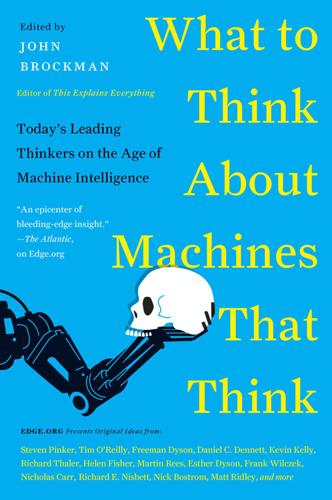
What to Think About Machines That Think: Today's Leading Thinkers on the Age of Machine Intelligence
by
John Brockman
Published 5 Oct 2015
That diet will be the massed strata of human experience preserved in our daily electronic media. The statistical baths in which we immerse these potent learning machines will thus be all too familiar. They will feed off the fossil trails of our own engagements, a zillion images of bouncing babies, bouncing balls, LOLcats, and potatoes that look like the Pope. These are the things they must crunch into a multilevel world model, finding the features, entities, and properties (latent variables) that best capture the streams of data to which they’re exposed. Fed on such a diet, these AIs may have little choice but to develop a world model that has much in common with our own.
…
Computers can recognize Internet images only because millions of real people have reduced the unbelievably complex information at their retinas to a highly stylized, constrained, and simplified Instagram of their cute kitty, and have clearly labeled that image too. The dystopian fantasy is simple fact: We’re all actually serving Google’s computers, under the anesthetizing illusion that we’re just having fun with LOLcats. And yet even with all that help, machines still need enormous data sets and extremely complex computations to be able to look at a new picture and say, “kitty-cat!”—something babies can do with just a few examples. More profoundly, you can generalize from this kind of statistical learning only in a limited way, whether you’re a baby or a computer or a scientist.
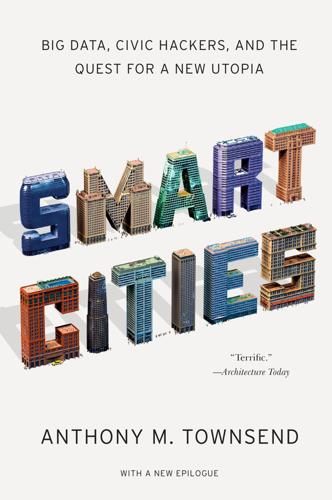
Smart Cities: Big Data, Civic Hackers, and the Quest for a New Utopia
by
Anthony M. Townsend
Published 29 Sep 2013
Digital Media City’s plans were bold—massive building-sized screens, obelisks projecting social-media streams into public plazas, and free Wi-Fi everywhere. Compared to that design, which echoed Generator in its celebration of the messy human side of the city, Songdo seems intent on engineering serendipity out of the urban equation. In a world of YouTube, FaceBook, and LOLcats, something about Songdo just doesn’t feel authentic, fully reflective of our everyday digital existence. For now, Songdo’s potential lies mostly in the somewhat distant future. The real magic of a fully networked and automated city won’t be seen until designers start writing code to program truly novel behaviors for entire buildings and neighborhoods.
…
We thought the Internet was about transcending the globe, and then it took a hyperlocal turn and became about swapping reviews of restaurants and getting free coupons for the local shop. We thought it would isolate social groups, and then it connected us all into one big network. We thought it was about staying home and looking at physics papers or LOLcats, and then in just a few years it powered over a million meatspace meetups. Smart-city hackers can’t do it alone. While we can show our business leaders and politicians how to build a more just, social, and sustainable future, we need their help to reach critical mass. Like Patrick Geddes, I believe that it will take a social movement that enlists science, the humanities, and us all to address the challenges we face building a planet of cities that can survive.
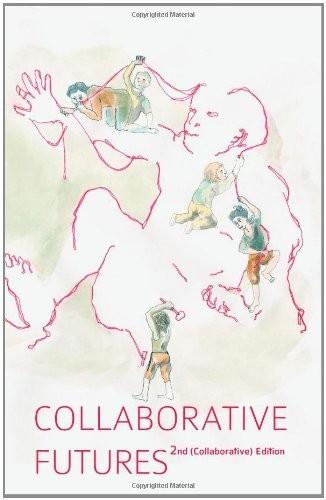
Collaborative Futures
by
Mike Linksvayer
,
Michael Mandiberg
and
Mushon Zer-Aviv
Published 24 Aug 2010
Adding a second layer Social media platforms can become collaborative when they add an additional layer of coordination. On a micro-blogging platform like Twi er, this layer might take the form of an instruction to “use the #iranelections hashtag on your tweets” or on a photo sharing platform, it might be an invitation to “post your photos to the LOLcats group.” These mechanisms aggregate the content into a new social object. The new social object includes the metadata of each of its constituent objects; the authors name is the most important of this metadata. This creates two layers of content. Each shared individual unit is included in a cluster of shared units.
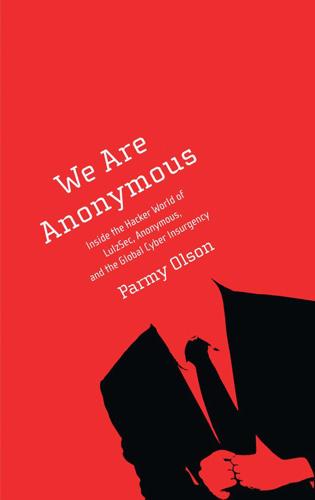
We Are Anonymous: Inside the Hacker World of LulzSec, Anonymous, and the Global Cyber Insurgency
by
Parmy Olson
Published 5 Jun 2012
Alongside gore and videos of abuse, pictures of naked women and men, and anime characters, there were endless photos of people’s cats. In 2005, users on /b/ had started encouraging each other to put funny captions under cute cat photos on Saturdays (or what became known as Caturday). These so-called image macros, photographs with bold white lettering at the top and a punch line at the bottom, eventually led to the LOLcats meme. It was the first of many memes to find mainstream popularity outside of 4chan, ultimately spawning other websites and even books. Thousands of image macros were made and then posted to 4chan and other image boards every day. A few went viral, turning into phrases repeated by millions of others for years afterward.
…
LulzSec revived the movement in the summer of 2011, with the vague goal of attacking government agencies and figures of authority in a sometimes superficial effort to expose corruption. /b/: The most popular board on 4chan, visited by about a third of the site’s users. /b/ was originally billed as the site’s “random” board by 4chan creator Christopher “moot” Poole. It ended up serving as a blank slate on which a host of creative Internet memes, such as Lolcats, were born, and is widely considered to be the birthplace of the Anonymous “hive-mind.” Many Anonymous supporters say they first found Anonymous through /b/. It is infamous for its lack of moderators. Black hat: Someone who uses knowledge of software programming for malicious means, such as defacing a website or stealing databases of personal information for the purpose of selling it to others.
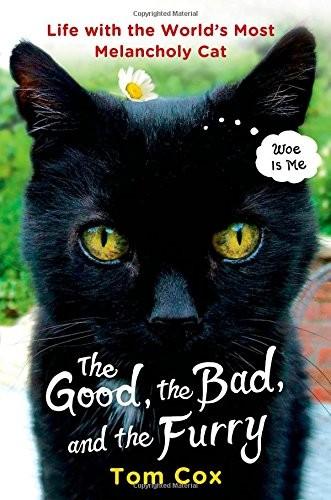
The Good, the Bad, and the Furry: Life With the World's Most Melancholy Cat
by
Tom Cox
Published 9 Oct 2013
For a cat lover, though, it’s a bit of a double-edged sword. There’s the wonder of having access to innumerable funny cat videos and being able to share your love of cats with other ailurophiles around the world. At its best, it can be very creative – like a more sophisticated version of ancient Egypt, with LOLcats and viral potentiality instead of hieroglyphs. (And who knows? All history is distortion. Maybe the Egyptians didn’t actually worship cats but just liked to share stupid pictures of them, and stuff got exaggerated over time?) Yet, at the same time, the sheer overkill of cat-related memes – and, for all the great cat-related content, there is no doubt that a huge amount of it is mawkish, repetitive, platitudinous rubbish – has turned ‘cat’ into a dirty word for many Internet users: something lowbrow that gets in the way of the real issues of social networking, such as telling people what you had for breakfast, upping the ad revenue of the Daily Mail by posting outraged links to its articles, or arguing with a complete stranger about whether or not you tweet too much.
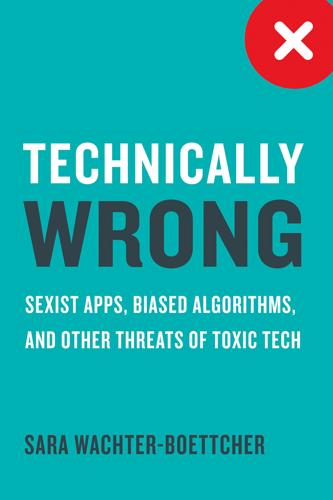
Technically Wrong: Sexist Apps, Biased Algorithms, and Other Threats of Toxic Tech
by
Sara Wachter-Boettcher
Published 9 Oct 2017
Facebook was just starting to transform from a college-centric site to the behemoth it’s since become. Fledgling messaging service twttr had just renamed itself Twitter. Google had just bought YouTube. The iPhone was about to launch. Pretty soon we’d be watching viral videos, rickrolling our friends, laughing at lolcats—and, of course, managing all that mundane stuff like banking and shopping from our screens. And that meant pretty much every business was aiming not just to have a website, but to figure out how technology might change the way it served its customers. So here we are, a decade later, and technology is so pervasive that a version of psychologist Abraham Maslow’s hierarchy of needs with “WiFi” added to the base of the pyramid has become one of the most enduring internet memes around.
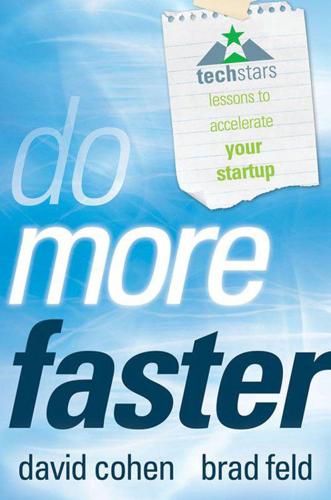
Do More Faster: TechStars Lessons to Accelerate Your Startup
by
Brad Feld
and
David Cohen
Published 18 Oct 2010
I know it's scary, but if you're dealing with someone who sucks at e-mail, sometimes you just have to pick up the phone and call. David Cohen aiming for “inbox zero” on a summer Saturday at The Bunker. Use What's Free Ben Huh Ben is the CEO of The Cheezburger Network, owner of popular sites such as Lolcats, Loldogs, and FAIL Blog, and has made more people laugh than anyone we know. He's been a TechStars mentor since 2009. One way to get leverage over all of the big players out there that you're competing with is to build your business to be more efficient than theirs. This is really easy for me because I'm a cheap bastard.

The Year Without Pants: Wordpress.com and the Future of Work
by
Scott Berkun
Published 9 Sep 2013
Unlike the graduates of the empty new-employee orientation events that companies inflict on recent hires, I could proudly say I'd simultaneously helped customers, improved my knowledge of the product, and befriended more than a dozen coworkers through actual work. But as good as I felt this was for me as an employee, I was thrilled to finally join my team and build something new. Notes 1 Caturday is a reference to the LOLCats meme, the popular images of cats doing cute things. All of the internal tools at Automattic referred to Saturday as Caturday. http://knowyourmeme.com/memes/caturday. Chapter 4 Culture Always Wins Before my story continues, I need to tell you about how WordPress started. This isn't simply because it's a great story, although it is, but to introduce its culture as a character in this book.
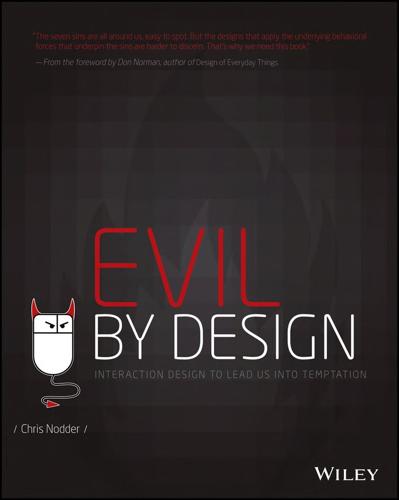
Evil by Design: Interaction Design to Lead Us Into Temptation
by
Chris Nodder
Published 4 Jun 2013
Mary Bale and Lola (youtube.com video) The “outing” was performed by a group who thrives on anonymity—members of the /b/ (random) board of the 4chan community. 4chan is closely linked with Anonymous, the group that is behind many high-visibility online retribution attacks. Although much of the content on /b/ will “melt your brain” according to Gawker.com’s Nick Douglas, /b/ members seem to have a soft spot for cats. They are responsible for the Lolcat meme and had previously interceded to ensure the welfare of Dusty, another cat who was seen being abused in a YouTube video. 4chan and Anonymous found a way to channel the anger of individuals within the community into coordinated action. Mary Bale commented after the event, “I did it as a joke because I thought it would be funny.
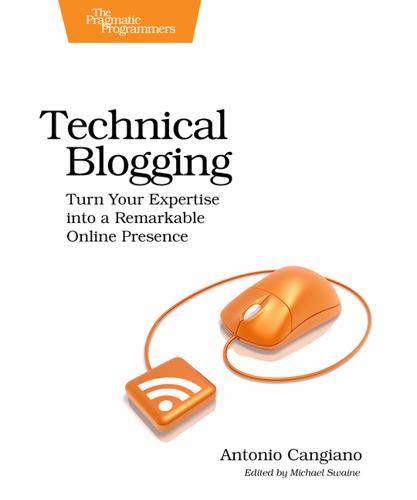
Technical Blogging: Turn Your Expertise Into a Remarkable Online Presence
by
Antonio Cangiano
Published 15 Mar 2012
If a multitude of blogs are born over time, they’ll progress into a network.[115] Each site promotes the network, typically at the top and the bottom of each site, in turn sending each other visitors, as shown in Figure 30, A network bar. One such example is the Cheezburger Network.[116] It all started with the popular LOLCAT blog I Can Has Cheezburger? and has expanded to now include dozens of blogs, including FAIL Blog and Memebase.[117] * * * Figure 30. A network bar Despite the humorous nature of these sites, networks like this can be very serious business. For instance, the aforementioned network received a $30 million investment.[118] Another example of one of the oldest blog networks is Gawker Media,[119] which includes popular blogs such as Lifehacker and Gizmodo.[120] Keep in mind that you don’t always have to come up with new domain names.
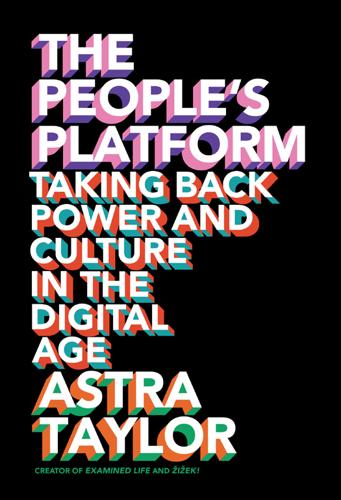
The People's Platform: Taking Back Power and Culture in the Digital Age
by
Astra Taylor
Published 4 Mar 2014
With their ample budgets, they can get their products onto our screens whether we want them there or not, buying advertising or the endorsement of A-list stars or securing other attention-grabbing signals. The idea, too often promoted by people who write books and command large followings, that things like LOLcats and comment sections have made culture “participatory” is hollow. Democratizing culture means choosing, as a society, to invest in work that is not obviously popular or marketable or easy to understand. It means supporting diverse populations to devote themselves to critical, creative work and then elevating their efforts so they can compete on a platform that is anything but equal.
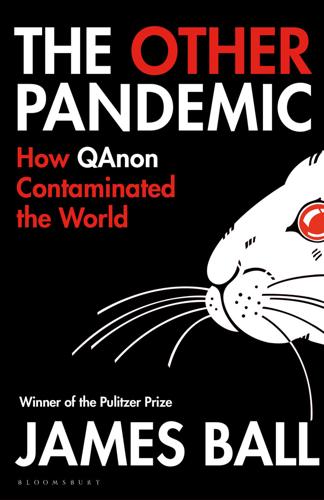
Other Pandemic: How QAnon Contaminated the World
by
James Ball
Published 19 Jul 2023
Such was 4chan’s influence on the internet culture of the 2000s and beyond that even the Wall Street Journal, in its 2008 article naming Poole, acknowledged it as ‘one of the most talked-about sites when it comes to launching new memes’. If you’ve ever been rickrolled, thank 4chan. If you’ve ever seen a lolcat: 4chan. If you’ve ever used the strange online vernacular of ‘o hai’ or ‘I herd u lik memes,’ that was born on 4chan too. Since its early days, 4chan played a unique role on the internet. It was a small core of people who spent a huge amount of time online and generated very particular memes and elements of online culture.

More Joel on Software
by
Joel Spolsky
Published 25 Jun 2008
But the next night, when the music resumed at midnight, I was really worn out, and it was more self-important Wagner rubbish, with pompous crescendos that consistently woke me up every time I finally drifted off to sleep, and I had no choice but to go sit in the living room and look at pictures of lolcats until it stopped, which it finally did, around 1 a.m. The next night I had had enough. When the music started at about midnight, I got dressed and started exploring the apartment building. I crept around the halls, listening at every door, trying to figure out where the music was coming from. I poked my head out windows and found an unlocked door leading to an airshaft where the music was amazingly 90 More from Joel on Software loud.

What Algorithms Want: Imagination in the Age of Computing
by
Ed Finn
Published 10 Mar 2017
This may sound utopian, but such practices have become a quotidian part of digital cultural experience. We tell collective jokes and stories using comment threads and hashtags, building shared narratives and farragoes that can evolve into sophisticated technical beings in their own right as Internet memes as superficial as #lolcats or as potent as #blacklivesmatter. These are moments of collective augmentation, leveraging digital platforms to build attention and consensus in ways that were previously impossible. This emerging channel for collective, ad hoc imagination has started to transform more staid cultural practices from the twenty-four-hour news cycle to the scholarly conference.
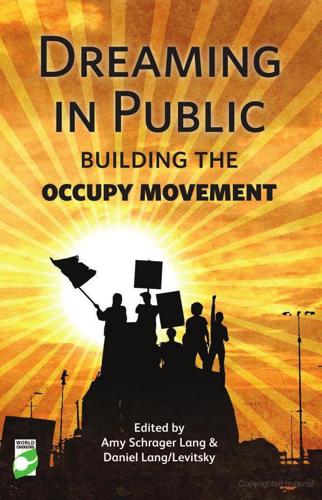
Dreaming in Public: Building the Occupy Movement
by
Amy Lang
and
Daniel Lang/levitsky
Published 11 Jun 2012
Still others, including the ‘Octopi Wall Street’ meme, rely on verbal play but appear in both electronic and physical form. ‘Occupy Sesame Street’ and the various uses of Star Wars characters represent the absorption and perversion of popular culture icons by the movement. The migration of online imagery to the streets – the Guy Fawkes masks of Anonymous; lolcats on protest signs – combined with the ironic sensibility that infuses Occupy placards – ‘I’m So Angry, I Made a Sign’; ‘This Is A Sign’ – speak to the importance of bricolage and self-parody to the movement’s culture. Beyond the bounds of this section, the texts of protest signs – earnest and sarcastic; insurrectionary and peaceful; classic and innovative – appear throughout this volume.

jQuery UI 1.8: The User Interface Library for jQuery
by
Dan Wellman
Published 14 Aug 2011
Custom localization is also very easy to implement. This can be done using a standard configuration object containing the configured values for the options from the previous table. In this way, any alternative language, not included in the roll-up file can be implemented. For example, to implement a Lolcat datepicker, change the configuration object of datePicker6.html to the following: var pickerOpts = { closeText: "Kthxbai", currentText: "Todai", nextText: "Fwd", prevText: "Bak", monthNames: ["January", "February", "March", "April", "Mai", "Jun", "July", "August", "Septembr", "Octobr", "Novembr", "Decembr"], monthNamesShort: ["Jan", "Feb", "Mar", "Apr", "Mai", "Jun", "Jul", "Aug", "Sep", "Oct", "Nov", "Dec"], dayNames: ["Sundai", "Mondai", "Tuesdai", "Wednesdai", "Thursdai", "Fridai", "Katurdai"], dayNamesShort: ["Sun", "Mon", "Tue", "Wed", "Thu", "Fri", "Kat"], [ 179 ] The Datepicker Widget dayNamesMin: ["Su", "Mo", "Tu", "We", "Th", "Fr", "Ka"], dateFormat: 'dd/mm/yy', firstDay: 1, isRTL: false, showButtonPanel: true }; Save this change as datePicker19.html.

The Last Stargazers: The Enduring Story of Astronomy's Vanishing Explorers
by
Emily Levesque
Published 3 Aug 2020
Still, lost era or not, observing with a hand on the telescope and the stars seemingly literally at arms’ reach is a wonderful sensation to imagine and a great story to tell. CHAPTER THREE HAS ANYBODY SEEN THE CONDORS? Thwump. The odd sound was enough to get me to shift my eyes a bit to the left, dragging them away from their previously critical job of alternating between the wind speed status window on one of the telescope’s computers and LOLCats. It was 2:00 a.m., I was sitting in the control room of one of the two 6.5-meter Magellan telescopes at Las Campanas Observatory, and as evidenced by both the wind gauges and the number of time-wasting tabs I had open in my browser, we hadn’t opened the telescope all night. I’d long since finalized and refinalized my night plan, assiduously prepared backup programs for different cloud-cover scenarios, and reviewed old data, but my brain had turned to mush around midnight, and I’d steadily devolved from “work on writing my thesis” to “stare at the telescope’s instrument manual and pretend I’m reading it” to “maybe there’s a funny animal GIF on the internet that I haven’t seen yet.”
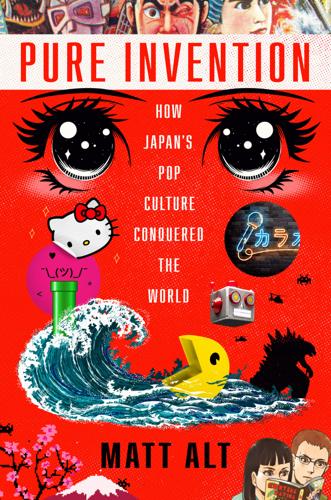
Pure Invention: How Japan's Pop Culture Conquered the World
by
Matt Alt
Published 14 Apr 2020
A deep-rooted culture of gleeful disdain for the establishment in any form made 4chan a haven for all sorts of creative rebels, oddballs, and outcasts; total anonymity made it a sandbox for extreme forms of expression. The combination was rocket fuel for fandom and subculture. Yet so too did it nourish trolling, fanaticism, and hate. On one hand, 4chan was a forge of fun, the birthplace of LOLcats and Rickrolling and doges, and countless other memes that have spread from its boards into mainstream Internet culture. Neither, though, can one discount its proven ability to radicalize marginal groups, ranging from the left-leaning social-justice activist collective Anonymous to the nihilist hacker group LulzSec to the alt-right white supremacy movement and all those “rootless white males” Bannon activated.
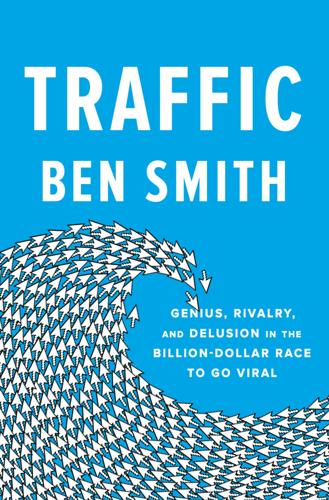
Traffic: Genius, Rivalry, and Delusion in the Billion-Dollar Race to Go Viral
by
Ben Smith
Published 2 May 2023
This was particularly mortifying because Peggy had once suggested online that Poole was her “internet crush.” But she was also surprised to discover that the founder of 4chan was so sweet and handsome. 4chan was disgusting—teenage-boy disgusting, to be fair—the source of much of the internet’s early meme culture of lolcats and rickrolling, which was 4chan’s own language, but the site was also full of racism and misogyny and sick jokes, which, back then, didn’t put Poole beyond the pale. His peers in a mostly white, mostly male scene wrote the racism and sexism off as irony. The kids on 4chan were your little brother who you figured would eventually grow up, the way Poole had, and become a quiet, productive—hot—member of society; they weren’t yet actual Nazis.
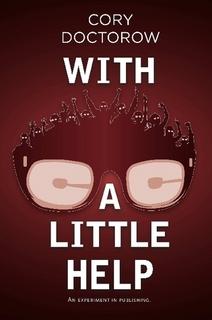
With a Little Help
by
Cory Efram Doctorow
,
Jonathan Coulton
and
Russell Galen
Published 7 Dec 2010
The most recent of these was the potent combination of digital information and global connectivity that transformed the end of the 20th century. I like to call it "The Internet," and mark my words, it's going to be very big. The struggling record industry, the death of the newspaper, the rise of LOLCats - these are just warning shots. Everything is going to get swallowed up eventually, and it's all going to get loud and messy and complicated. Forget space travel, this is the future we need to imagine now, and quickly, before it overtakes us. 29 Luckily, we have Cory Doctorow; he thinks about the Internet, a lot.
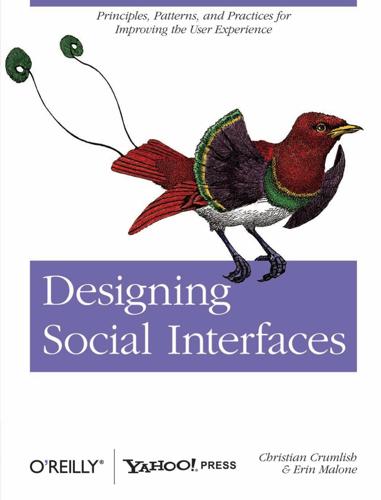
Designing Social Interfaces
by
Christian Crumlish
and
Erin Malone
Published 30 Sep 2009
Even in a formal or sensitive situation, it’s equally important to avoid blaming the victim when a problem occurs. Examples GetSatisfaction.com takes responsibility (“We couldn’t find it”) when a search turns up no results (Figure 2-10). Figure 2-10. Get Satisfaction doesn’t make the user feel bad when a search fails. Likewise, Twitter takes the blame for a failed search, makes light of the problem with a LOLcat image, and offers some links to help the user proceed. Ask Questions One of the most common structures for a human conversation or dialogue is the format of question and answer (Figure 2-11). Since the days of the oldest mailing lists, Usenet, and Gopher, frequently asked question lists (FAQs) have sought to answer a person’s questions with either the collected wisdom of the community or the answers from some authority.
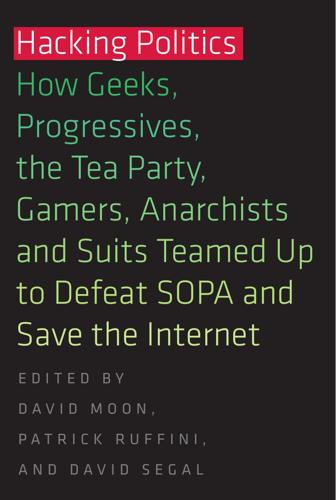
Hacking Politics: How Geeks, Progressives, the Tea Party, Gamers, Anarchists and Suits Teamed Up to Defeat SOPA and Save the Internet
by
David Moon
,
Patrick Ruffini
,
David Segal
,
Aaron Swartz
,
Lawrence Lessig
,
Cory Doctorow
,
Zoe Lofgren
,
Jamie Laurie
,
Ron Paul
,
Mike Masnick
,
Kim Dotcom
,
Tiffiniy Cheng
,
Alexis Ohanian
,
Nicole Powers
and
Josh Levy
Published 30 Apr 2013
Hell, even my mom told me that she “voted” for “privacy” (not quite Mom, but thanks for the support!). We created a movement. One that was decentralized, bottom up, and insanely chaotic. One that very much resembles the Internet. We created a meme—the SOPA meme—that propagated throughout the web and mutated into various forms (show toilet paper, tshirt, the day the lolcats died, etc). We harnessed the power of the Internet to reach out to millions upon millions of people. We rode the energy and momentum arising from the SOPA meme to kickstart the ACTA meme in Europe—members of the Polish parliament even wore Guy Fawkes masks in protest! And we showed the other side that we would not stand for backroom deals, special interests, or companies trying to preserve their outmoded business models at the expense of the open Internet.
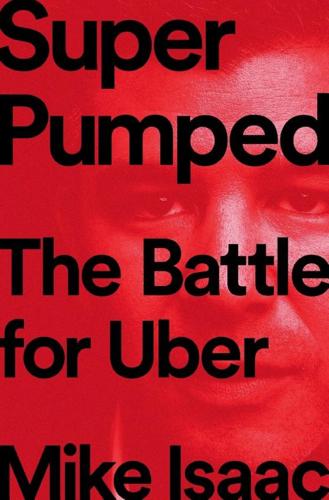
Super Pumped: The Battle for Uber
by
Mike Isaac
Published 2 Sep 2019
But those qualities belied a pugnacious streak. Smith had become known in Washington DC for never backing down from a fight. As a reporter at Politico he often sparred on Twitter with those he covered and those he competed with for scoops. When he moved to BuzzFeed in 2012, his mandate was to turn the outlet, long famous for its lolcats and list-oriented viral articles, into a respectable, hard-hitting news organization. Smith rebranded his division as BuzzFeed News, and soon built a serious outfit whose reporting standards and aggressive pursuit of scoops rivaled that of the most traditional newsrooms. Smith was thus shocked when he, a member of the media, found himself sitting across from an Uber executive who was so openly disdainful about Uber’s relationship with the press.
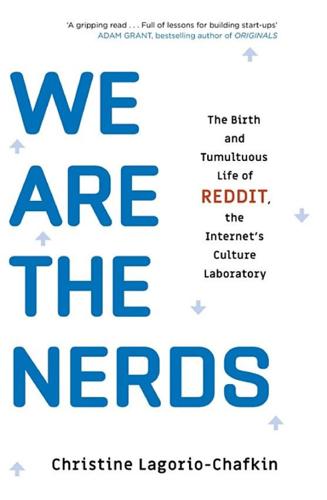
We Are the Nerds: The Birth and Tumultuous Life of Reddit, the Internet's Culture Laboratory
by
Christine Lagorio-Chafkin
Published 1 Oct 2018
Users were handed more and more power to control corners of the Reddit universe. In late May 2008, Huffman more broadly opened up the ability for any user to create a section of Reddit—what would become known as “subreddits.” By default, the user who created the section, say, r/atheism, would be its moderator. Users quickly created r/WTF, r/lolcats, and r/offbeat, sections with little purpose aside from wasting time but that would over the next decade amass millions of regular viewers and loyal subscribers. There was higher-brow Reddit, too: Subreddits for entertainment, photography, and art flourished. For example, photos of the eerie art installation of a tiny freestanding Prada store in Marfa, Texas, got upvoted.
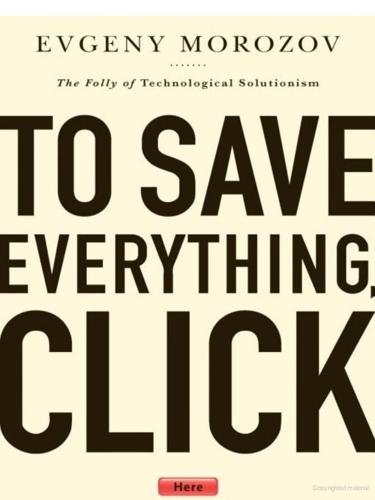
To Save Everything, Click Here: The Folly of Technological Solutionism
by
Evgeny Morozov
Published 15 Nov 2013
But while trying to do justice to the role of the printing press in history, Eisenstein embraces a rather limiting view of print media, overemphasizing what she believes to be the inherent qualities of this technology: fixity (i.e., its ability to preserve texts that might otherwise get lost or badly damaged), ease of dissemination, and the tendency toward standardization. According to Eisenstein, the very technology of print endows texts with these new qualities—and the rupture is so significant that she elevates those qualities to the status of “print culture.” The latter gives us the Reformation, the scientific revolution, the Big Mac, Steve Jobs, and LOLCats. Many scholars have noted the limitations of Eisenstein’s approach, which are extremely pertinent to the contemporary Internet debate. The first to ring alarm bells—in 1980, just a year after the book was published—was intellectual historian Anthony Grafton, who berated Eisenstein for pulling “from her sources those facts and statements that seemed to meet her immediate polemical needs.”
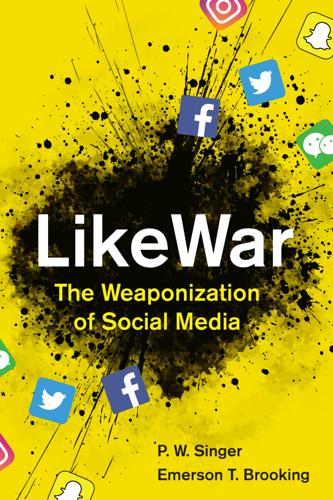
Likewar: The Weaponization of Social Media
by
Peter Warren Singer
and
Emerson T. Brooking
Published 15 Mar 2018
As the web became more image- and social media–friendly, what we know as the “internet meme” was born. These were images or short GIFs, often overlaid with text and easily shareable, that relayed ideas fast. Grasping their full meaning, however, required understanding not only the content at hand but also its previous iterations. For instance, the LOLCats phenomenon, comprised of tens of thousands of cat pictures with misspelled captions, becomes funnier (to a point) only if you’re familiar with the context to which it refers—the pervasiveness of cat images on the internet. Indeed, the most effective memes often build not merely on themselves but on other memes as well.
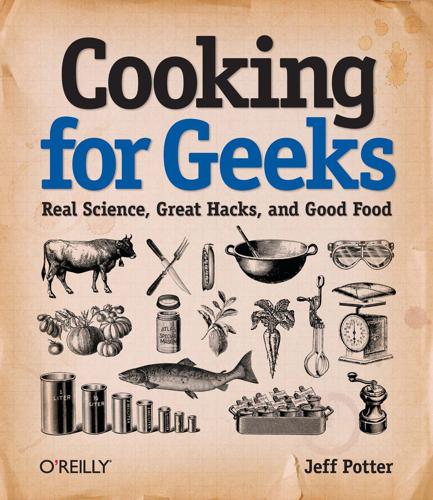
Cooking for Geeks
by
Jeff Potter
Published 2 Aug 2010
For most of us techies, the largest obstacle in building something great has changed from a technical to a social one. The question is no longer can you build it, but will people want it? We’re becoming a different kind of community, one that has to relate to a half a billion Facebook users, Twitterers, and lolcats. (I can has cheezburger? See Simple Cheeseburger.) But what it means to be a geek today can also be broader. Overly intellectual. Obsessed with details. Going beyond the point where a mainstream user would stop, often to the bemusement of those who don’t "get it." Physics geeks. Coffee geeks. Almost-anything geeks.
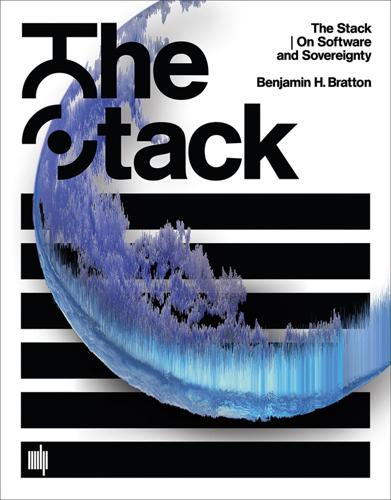
The Stack: On Software and Sovereignty
by
Benjamin H. Bratton
Published 19 Feb 2016
Unless new technologies, such as widespread multicore fiber, are widely deployed in the next decade, the physical limits of how much information can actually pass through a given channel may introduce new economies of bandwidth scarcity, prioritization, and pricing.28 At the same time, newer networks with greater carrying capacity, as well as faster signal throughput, may provide new kinds of Cloud services previously only imagined, such as holodeck-quality virtual environments. Such accomplishments may steer primate evolution toward shared intersubjective experience, introducing fantastic new genres of narrative, design, architecture, poetry, medicine, and music at a planetary scale, or it may allow a select few to watch 8K LOLcat videos from 10 angles at once. The pressure of that physical limit also pushes against the geoeconomics of the Internet backbone and private Cloud platforms, forcing how their development impacts on political geography as a whole. Instead of thinking of the Cloud as a bunch of individual private computers connected to data centers by big public pipe, it is perhaps better to think of any (at least partially) gated Cloud network as a single vast discontiguous computer, linking servers to browsers and back again, such that functions that may have once happened “inside” any one device now happens on the device's “outside,” now on and in the network itself.

She Has Her Mother's Laugh
by
Carl Zimmer
Published 29 May 2018
They struggled to reach it from sluggish desktop computers and through screeching modems. In the following decades, the Internet expanded its reach, infiltrating phones and cars and refrigerators. By 2016, almost half the world was prowling its nodes. The early listservs and forums gave way to giant social media platforms. Across this new memetic ecosystem, LOLcats and the Crazy Nastyass Honey Badger began to roam. A website called Know Your Meme cataloged thousands of digital replicators, to help the befuddled keep up with new memes, and to help the forgetful to recall those of years gone by. The 2016 United States presidential election became a war of memes as operatives looked for the stories and photographs—genuine or doctored—that could spread a political message.
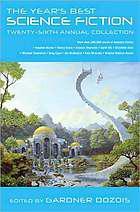
The Year's Best Science Fiction: Twenty-Sixth Annual Collection
by
Gardner Dozois
Published 23 Jun 2009
Even now, in the middle of the night, a tiny slice of Kulaap’s fan base is reading about checkerspot butterflies and American government incompetence. In my country, this story would not exist. A censor would kill it instantly. Here, it glows green; increasing and decreasing in size as people click. A lonely thing, flickering amongst the much larger content flares of Intel processor releases, guides to low-fat recipes, photos of lol-cats, and episodes of Survivor! Antarctica. The wash of light and color is very beautiful. In the center of the maelstrom, the green sun of the Double DP story glows—surges larger. DP is doing something. Maybe he’s surrendering, maybe he’s murdering his hostages, maybe his fans have thrown up a human wall to protect him.